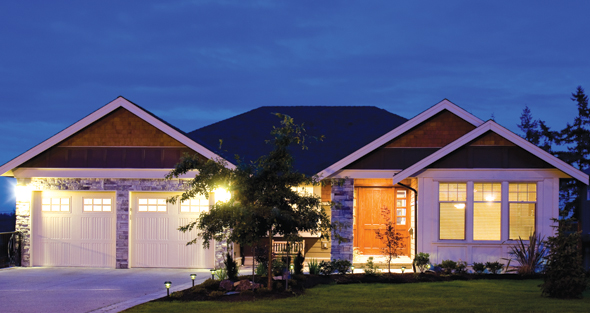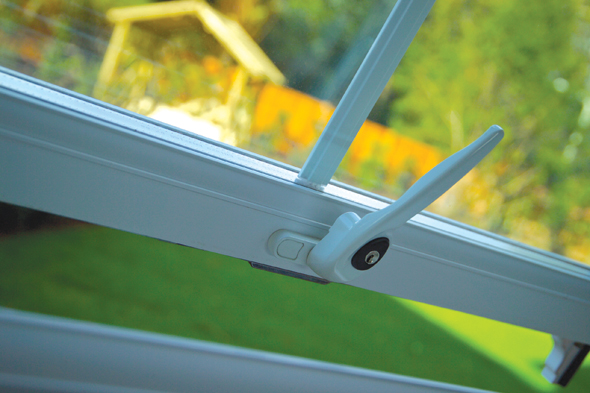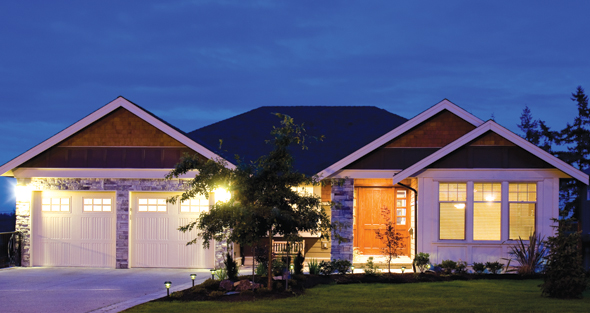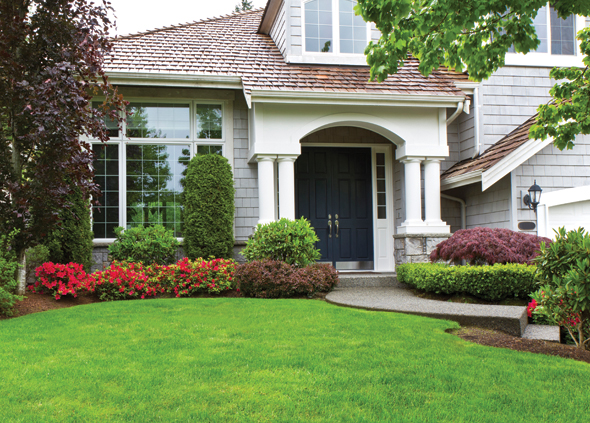When a customer comes in asking for a dead bolt, a well-trained employee will almost immediately start discussing the features and benefits of the locksets stocked in the store. But what if we told you that the ability to close the sale on a deadbolt is only half the battle, and that retailers frequently miss opportunities for add-on and project-based sales in the home security category?
While you’d never want to sell products by preying on customers’ fears, it’s important to help customers find ways to keep their homes and families safe. In addition, by teaching employees how to promote entire projects around home security, you may be able to increase transaction sizes and develop your store as a destination for safety.
We’ll discuss three categories you already stock in your store that can be promoted for their home security features and how some easy project training tips can help you secure more sales in this area.
Locking Up
What the customer comes in for: Locksets
Add-on Sales Opportunities: Dead bolts, strike plates, door frames, screws, window locks, door chains
According to the National Crime Prevention Council (NCPC), only about half of Americans have dead bolt locks on their homes.
Help the customer understand how to prevent break-ins by upgrading the lockset he came in for. Adding a dead bolt and upgrading both the dead bolt and lockset to higher grade alternatives can offer more security. Teach employees to promote the fact that the NCPC recommends dead bolts with at least a 1.5-inch throw or greater on all exterior doors and have them show customers how added strike plate boxes and quality strike plates can help improve the overall performance of their locksets.
But don’t stop there. Does the customer have the screws he needs to install the strike plate box? If the customer was a victim of a burglary, was the door frame damaged during the incident? Show him your door frames and the different areas to check to ensure his frames are still sturdy.
Half of project selling is encouraging your employees to ask these types of questions. Many times, customers will simply forget they need these add-on items and will appreciate the guidance.
“Dead bolts are the first thing we suggest to our customers,” says William Hester, manager of Old School Hardware in Washington, D.C. “Each of their exterior doors should have a dead bolt that works properly.”
Bruce Bloom, owner of North Hollywood Hardware in Studio City, Calif., also advises customers to add chains or slide bolts to their doors in addition to dead bolts for added security.
Employee knowledge of how to sell these projects is key. “We are a small store without a home security department; these products are all around the store,” Hester says. “Because they’re spread out, we really fall back on our staff to guide the customer through the store.
“There’s a critical difference between having the merchandise in your store, compared with having it in your store and having a knowledgeable staff that can guide the customer.”
Check your local paper for real estate or property transfers to find out where the new homeowners in your community are and send them coupons for free keys or discounts on a lockset purchase. This can be part of a “welcome to the neighborhood” package, complete with discounts on a variety of necessities for new homeowners. This tactic will not only get them in the door for home security products, but it will make them regular customers to your store, too.
Locksets also offer an opportunity for promotion to local apartment and rental companies that regularly change locks and need a trusted retailer to help achieve safe homes they can promote to potential tenants.
And while the customer may be coming in for a lockset for his front door, you might suggest he look at products to secure other exterior areas of his home—such as windows, which can leave consumers vulnerable if not properly protected.
“We tell our customers to make sure all their windows have locks, not just those on the first floor,” Bloom says. “Someone can easily climb up to the second floor.”
Let There Be Light
What the customer comes in for: Decorative porch lights
Add-on Sales Opportunities: Landscape lights, motion-sensor lights, timers, light bulbs, blinds or curtains
The NCPC says lighting is one of the most cost-effective ways to deter burglars, but retailers often don’t think to promote home security when their customer is looking at different porch light styles.
This is an opportunity to talk with an attentive customer about how outdoor lighting can serve two purposes—decorative and security. Ask customers how big their yards are to get an idea of how many lights they may need throughout their landscaping (rule of thumb is a light every few feet). Lighting can also include small pathway lights to add along sidewalks and motion-sensor lights that can go near side doors or garages to help extend security beyond the walls of the house.
“We recommend motion sensors both in the front and the back of a home,” Bloom says. “Customers need to remember to keep their backyards secure.”
Hester agrees. “They’re low-maintenance and pretty much hands-free. I would advise everyone to sell motion-sensor lights and every customer to have one or two at their home.”
Also, think about offering perimeter checklists to hand out to consumers so they can do audits of their own homes. While every house is different, having a list of lighting options to give customers ensures you sell them what they need and reminds employees to ask customers if they have everything they need to complete their projects. Establishing your store as a place for expert advice and quality products for safety is an important part of promoting home security.
And when a customer comes in looking for outdoor lighting for security reasons, don’t forget to ask him about indoor security lighting as well. For example, lights with timers are especially useful when homeowners are out of town for a few days.
Hester recommends a minimum of one, but preferably two, timers in each house. “We stress to our customers how easy they are to plug in and program, and it’s hands-free after that.”
The Great Outdoors
What the customer comes in for: Plants or flowers
Add-on Sales Opportunities: Shrubbery, gravel, hedge clippers, grass seed, lawn mowers
When your employees are out selling flowers, home security is probably the last thing on their minds, but different types of plants and flowers can actually serve as protection against crime.
Show customers your selection of prickly hedges or plants with thorns, like rosebushes, which, when planted near doors or windows, deter burglars from trying to enter a home. Ivy or other climbing plants that go up the side of a house is one more obstacle for a burglar trying to climb through a window.
Take it beyond plants, though—gravel makes a loud noise when walked on, allowing homeowners to hear if someone is outside their house.
This is the perfect opportunity to sell gardening equipment. Customers may have larger shrubbery that provides privacy, but it can also provide cover for potential burglars. Show customers different hedge clippers you sell so they can keep shrubs trimmed and all windows and doors clearly visible.
Because nothing says “No one’s home” like overgrown shrubs and tall grass, make sure your customers have lawn mowers, weed eaters, rakes and all other gardening equipment they need to maintain their lawns and gardens.
Annuals, grass seed, fertilizer and other gardening equipment are also good add-on sales.
What’s New in Home Security
One of the big trends right now in home security is full-home automation systems. These systems allow homeowners to set alarms, lights, locks, thermostats and more to work together and be controlled remotely. Customers simply install an app on their smartphones or tablets to make sure a door is locked (and lock it if it’s not) and double-check that an alarm system is set (and set it if it isn’t) while they’re away from home.
Tying the systems together makes it easier for homeowners to control everything from one place—whether that be their couches, cars or offices. They can even set up the cameras to record photos or videos when movement is detected have those recordings emailed to them.
Wireless alarm systems go hand-in-hand with this new technology. They’re becoming more and more popular because they’re so easy to install. They also can be moved from one location to another—perfect for renters or someone who plans to move in the next few years.
Keyless locks are also gaining popularity, especially for homeowners who regularly have people coming and going. “Customers who have nannies or housekeepers like these because it’s easier to just give them a code to key in,” Bloom says.
Because high-tech products are becoming more mainstream with consumers and can increase your store’s margin potential, they might be worth considering. If you want to venture into some of these technology-driven home security assortments, start small and pick up just one or two products to see if your market will support these products.
 Hardware Retailing The Industry's Source for Insights and Information
Hardware Retailing The Industry's Source for Insights and Information









